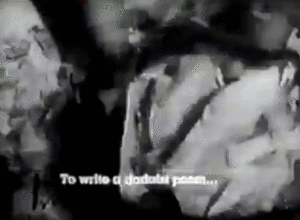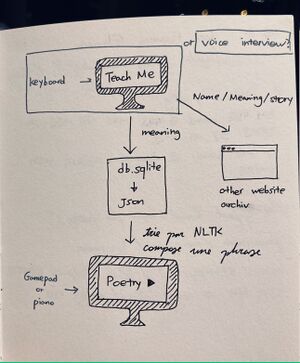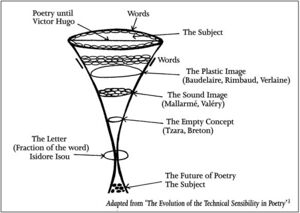User:Euna/Graduation: Difference between revisions
No edit summary |
|||
| Line 3: | Line 3: | ||
==What do you want to make?== | ==What do you want to make?== | ||
[[File:Comp-poetry.gif|thumb|computational poetry]] | [[File:Comp-poetry.gif|thumb|computational poetry]] | ||
The goal is | I’m going to make computational sound poetry with collected meanings of verbal words from spectators. Both lexical and personal meanings are welcomed. The spectator register their name, meaning, and origin of the meaning. | ||
The goal is that the spectator experience how large one word can be expanded (differently interpreted) and to enjoy the poetry from these differences. | |||
==How do you plan to make it?== | ==How do you plan to make it?== | ||
Revision as of 15:02, 7 October 2021
Draft Project Proposal
What do you want to make?
I’m going to make computational sound poetry with collected meanings of verbal words from spectators. Both lexical and personal meanings are welcomed. The spectator register their name, meaning, and origin of the meaning.
The goal is that the spectator experience how large one word can be expanded (differently interpreted) and to enjoy the poetry from these differences.
How do you plan to make it?
For now, I’m reading « Prehistoric Digital Poetry Book by Chris Funkhouser ».
Keywords for coming research :
- Computational writing
- computational poetry
- sound poetry
- translation
- language
- Collective archive
- Participatory art
Practice
with python.
Flask to create web sites and NLTK to compose sentences.
1) A software or a web site to make computational (sound) poetry.
As the spectator control the input (not a normal keyboard! But, game pad button or piano keyboard) computer plays correspond sound and shows sentences composing with the collected meanings.
2) A digital space where the spectator can register their word; after listening to a pronunciation, he/she write its meaning (from a dictionary or personal story) and origin. This will be served as a database to make computational poetry.
3) Collective Dictionary or Archive of 2
What is your timetable?
These are the key dates for 2021-22
19 November - Graduate Proposal Deadline Last year's Graduate Proposals UPLOAD YOUR PROPOSAL HERE! 19 November - Thesis Outline Deadline Last year's Thesis OutlinesUPLOAD YOUR THESIS OUTLINE HERE! 3 Dec - Deadline First Chapter 18 Feb - Deadline First Draft Thesis 18 March - Deadline Second Draft thesis (texts to 2nd readers) 1 April - Deadlines Second readers' comments 14 April - DEADLINE THESIS
- Oct - Nov
Make a php website to collecting the meaning
Test the collection (vocal interview and small meaning exchange exercise)
Continue to read
- Dec - Jan
Continue to collect the meaning (invite the people actively)
Make a collective dictionary
- Feb - March
Make a web for the poetry (Json database as NLTK source and compose phrase)
- April - May
Make all webs and installation work
Why do you want to make it?
It’s in an extension of my previous project, a dictionary with my personal English. But as everyone experiences this linguistic confusion, I want to make one with a bigger scope: I invite others to talk about their interpretation, take a look at other's experiences, and play with.
Who can help you and how?
Manetta and Michael for conceptual and technical matters.
Aymeric for authorship and license.
Participants from various backgrounds to nourish my database.
Relation to previous practice
During SI15, I did voice performances and as a result of awkwardness of my English (especially pronunciations), I made dictionary with my English. This language question stretches back to my previous project in bachelor; poetry with homonyms between Korean and French words. Also, I made computational poetry like poetry (not really automated, because of lake of my coding skill…)which I codified the number of supermarket merchandise’s barcodes to listen to what they want to say in human language.
Relation to a larger context
Randomly generated digital works, works that appear in sequences (either static or animated), and many hypertexts (which are typically presented as a series of interlinked fragments) embody the type of postmodern conditions of textuality put forth by Derrida, Baudrillard, Foucault, Deleuze and Guattari, and others. (Chris Funkhouser, Prehistoric Digital Poetry Book)
Derrida said, language has lots of possibilities to be translated differently -> meaning is not fixed and signifier / signified relation is just accidental. The computer is capable of embodying this randomness and variability of language. That’s why computational poetry appeared around this time of Derrida(1965).
But even before, Dada, Fluxus and Oulipo questioned a lot about interpretation in language and made algorithmic poetry.
References/bibliography
Read
- Vilem Flusser, Does writing have a Future?
- Chris Funkhouser, Prehistoric Digital Poetry Book
- Nicoline van Harskamp, My Name Is Languages
- Olia Lialina, Digital Folklore
- Ivan Junqueira, Is poetry untranslatable? (https://hogeschoolrotterdam.on.worldcat.org/v2/search/detail/8598237785?queryString=Untranslatable%20Terms%20Of%20Cultural%20Practices&stickyFacetsChecked=on&clusterResults=true&groupVariantRecords=false)
- Michaële Hancher, Humpty Dumpty and verbal meaning (https://www.jstor.org/stable/430352?origin=crossref)
Project
- Antoni Muntada, The file Room, https://rhizome.org/editorial/2016/nov/17/antoni-muntadas-the-file-room/
- Antonio Roberts AKA Hellocatfood commission, http://www.electronicvoicephenomena.net/index.php/sp3l-aend-spik-antonio-roberts-aka-hellocatfood-commission/
- Transcommunautaire Karaoke Transcommunautair, https://gallery3.constantvzw.org/index.php/Transcommunautaire-Karaoke-Transcommunautair
- ParlezVous1016, https://www.parlezvous1060.be/fr/w/Allumette.html
- Steve Reich’s Different Trains https://www.youtube.com/watch?v=qcGqVynCPaw



